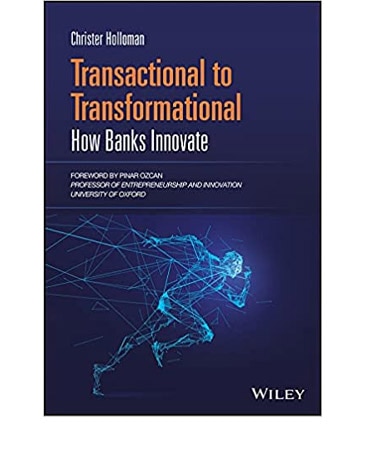Propel changes the financial industry’s venture capital model
With more than 40 companies in its portfolio, six of them considered unicorns (valued above $1 billion) and two listed on the public stock markets, Propel has become a corporate venture capital benchmark since it was founded five years ago. The book 'Transactional to Transformational - How Banks Innovate', recently published by Wiley, recounts how BBVA opted to create an independently managed fund in order to approach the most promising fintech.

 BBVA recently renewed its investment commitment with Propel. The venture capital fund, managed autonomously from San Francisco by Jay Reinemann as main partner, is already managing the first $50 million of the $150 million announced last February. This new injection of capital increased BBVA's total commitment to the venture capital fund to $400 million, taking into account the previous investment of $250 million made in 2016.
BBVA recently renewed its investment commitment with Propel. The venture capital fund, managed autonomously from San Francisco by Jay Reinemann as main partner, is already managing the first $50 million of the $150 million announced last February. This new injection of capital increased BBVA's total commitment to the venture capital fund to $400 million, taking into account the previous investment of $250 million made in 2016.
Coinbase's IPO is yet another of these examples. Before this cryptocurrency wallet was launched with a stir on Nasdaq, leading to a market capitalization of more than $47 billion, Propel had already seen the DocuSign IPO in 2018, for which the digital signature giant's valuation surpassed $53 billion.
Propel’s investment in Personal Capital is one of the most successful. The company offers tools to manage and advise individual client investments and was sold for more than $1 billion to Empower Retirement in 2020. Recently, in 2021, Propel achieved yet another relevant return in its short history when the home insurance agency Hippo merged last year with Reinvent, a special purpose acquisition company (SPAC) that valued it at more than $5 billion.
Without a doubt, all of this shows Propel’s most notorious successes, but it has recently added two new promising investments to its portfolio, which fall into the unicorn classification. It recently saw a new capital increase from Guideline, whose system to simplify the management of retirement plans for SMEs, is attracting more and more investors and clients. Prior to that, Propel made its first investment in Asia with India's Groww, an investment platform startup with 10 million users and big plans for expansion.
“Not all are success stories,” said Jay Reinemann, who recalled many investments that did not come to the fore. In fact, Reinemann explained that normally in a fund only 20 percent of investments compensate for the remaining 80 percent.
“We try to pick the 1 percent of fintech companies that will end up growing and developing into a massive category defining business. This is the hardest part of our job,” acknowledged Propel's senior partner, who has spent a whole career in Silicon Valley, now hand in hand with BBVA and formerly at VISA.
“Our goal has always been to be the best partner for startups. We really want to support the founders and help make the project we are committed to grow,” he emphasized. This element of wanting to be more than just an investor, but being a partner with whom you can exchange knowledge is a differentiating element for Propel. In fact, this factor was decisive in creating the Propel model, which Wiley's book now includes as a success story.
From spectator to player
BBVA has been in Silicon Valley for a long time to improve its position in a highly competitive ecosystem, where the best entrepreneurs have many investor options to choose from. "It was necessary to stop being a spectator and become a player in the ecosystem," said Ricardo Forcano in the book, as a former BBVA CIO and promoter of the first venture capital fund created in Silicon Valley in 2009 called BBVA Ventures.
The problem was that startups dodged corporate funds because of the potential conflicts of interest in the long run. So in order for these investments to be truly useful in accelerating BBVA's transformation, a spin-off was created that separated the fund and its management from the bank.
This model allows Propel to feel freer and more agile when making decisions, while BBVA has indirectly extracted valuable learning that it has applied to its organization.
Future
Propel’s model marked a path that other banks later followed, although it continues to constantly transform itself. In this new stage, with the renewal of BBVA's commitment to invest another $150 million, Propel is considering seeking new fund. “We started with a $50 million fund from BBVA, but the plan is that in the coming years, we will incorporate new investors, additional corporations and traditional institutional investors, that would complement BBVA and that trust Propel to identify the companies with the greatest disruptive potential in financial services,” said Reinemann.
“At BBVA we greatly value the relationship created with Propel, which has allowed us to be part of the innovation ecosystem and to find great opportunities. Beyond the benefits that Propel investments can bring, we look for models that complement us, that target segments we are in or that are exploring new ways of doing banking. We want models that inspire BBVA to create new business models or show us different and more effective ways to get closer to our clients,” explained Jordi García Bosch, Head of New Businesses and Strategy in Clients Solutions at BBVA.
Reinemann added that it is still too early to talk about a return on investment and Propel's results. “We invest in very early phases of the business, which, on average, take between 7 and 10 years to mature. For example, Amazon took 15 years to become profitable. And Propel has only been in business for five years so it still has a long way to go and can show much better results than it has already delivered,” he concludes.
As for the future, Propel is looking to new markets, with a special focus on Latin America, where it sees many opportunities with a large part of the population still unaware of the banking system and in need of new services to get on board with financial services. And in terms of sectors, Reinemann points to decentralized finance (DeFi), the integration of technologies to deliver embedded services and the world of insurance as three areas where innovation and entrepreneurship have many opportunities to transform the financial industry.